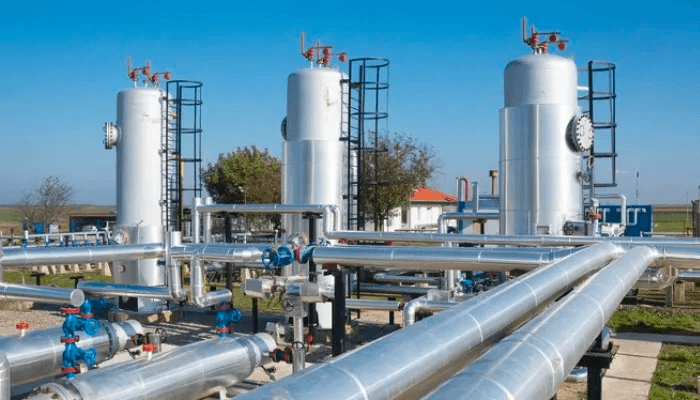This article is as much about the behemoth, Dangote Refinery and Petrochemicals (Dangote Refinery for short), as it is about the power of private initiative and private enterprise. Two of the best-known quotations of the great Austrian economist Joseph Schumpeter (1883-1950) about entrepreneurship are ŌĆ£Profit is the payment you get when you take advantage of changeŌĆØ and ŌĆ£The function of entrepreneurs is to reform or revolutionise the pattern of production by exploiting an invention or, more generally, an untried technological possibility for producing a new commodity or producing an old one in a new way, by opening up a new source of supply of materials or a new outlet for products, by reorganising an industry and so on.ŌĆØ Schumpeter was far from being a ŌĆścapitalist philosopherŌĆÖ but a well-rounded economist who was equally at home in sociology, political theory, and philosophy. The entrepreneur is the purveyor of change and innovation in the marketplace.
Read also:┬ĀWhy NNPC should sell adequate crude to Dangote refinery in Naira, says NLC
Bill Gates was at the forefront of digital technology innovations with the introduction of Windows 95, the groundbreaking operating system developed by Microsoft and released in August 1995. Elon Musk is riding the waves of cutting-edge innovations in diverse fields with consequential unprecedented rewards, and our own Aliko Dangote is making landmark achievements as the torchbearer of entrepreneurship in Africa, daring great odds and venturing into terrains where lions dare not tread. He is not alone. He is inspiring a new generation of contemporary and younger African entrepreneurs. Some of DangoteŌĆÖs milestone entrepreneurial achievements include helping Nigeria achieve self-sufficiency in cement production in less than twenty years, beginning from 2002, and establishing a petroleum refinery with the capacity to make NigeriaŌĆÖs fuel sufficient. Recently, he has been envisioning making Africa self-sufficient in fertiliser production within 40 months.
ŌĆ£The Federal Government should be encouraged to stop vacillating in its approach to privatisation and engage with the private sector to turn around critical sectors of the Nigerian economy.ŌĆØ
Some of the facts about the Dangote Refinery, using official data from Dangote Industries, include the following: The refinery covers a land area of about 2,635 hectares ŌĆō about six times the size of Victoria Island. It is a 650,000-barrel-per-day (BPD) integrated refinery located in the Lekki Free Zone of Ibeju Lekki, Lagos, and it is AfricaŌĆÖs biggest oil refinery and the worldŌĆÖs biggest single-train facility. Its pipeline infrastructure is the longest in the world, with 1,100 kilometres to handle 3 billion standard cubic feet of gas per day. The refinery is serviced by a 435-megawatt (MW) captive power plant with the capacity to supply the total power needs of all the states covered by the Ibadan power distribution company. It has the capacity to create a market for $21 billion per annum of Nigerian crude and is designed to process both Nigerian and other crudes.
What the Dangote refinery has done is to prove that local refining of petroleum products on a large scale is no rocket science and to, in one fell swoop, achieve self-sufficiency in fuel refining for Nigeria, which the Nigerian National Petroleum Corporation (NNPC) could not accomplish in almost five decades of its existence. It also, for the first time, started local production of aviation fuel, something NNPC refineries could not do.
What the foregoing has proved beyond a reasonable doubt is the power and superiority of private enterprise and private initiative in the marketplace. It is only the private sector that has the entrepreneurial drive, the risk-taking and managerial capacity to organise and mobilise enormous combinations of equity and loan capital under stringent financing conditions, and the technical skills to deliver gargantuan industrial products like the US$20 billion Dangote Refinery and Petrochemicals, and to do so with value for money within agreed timelines.
Furthermore, it is practically difficult to fully comprehend the economic value of the coming on stream of the Dangote Refinery to the Nigerian economy and polity. President Bola Ahmed Tinubu could not have embarked upon his bold economic reforms without the Dangote Refinery. Or to put it another way, the removal of the fuel subsidy and the floating of the naira, which saw the elimination of the multiple exchange rate regime, as inevitable for the survival of the Nigerian economy as they were, would have come at a much higher cost of fuel prices and a greater depreciation of the naira without the buffer provided by the local production of fuel products by the Dangote refinery ŌĆō a situation that could have led to unbearable economic hardship and consequential political instability.
The lesson to learn from the outstanding success of Dangote Refinery in bringing Nigeria within the range of fuel sufficiency, on the one hand, and the abject failure of the four NNPC refineries, which today do not refine a single barrel of crude oil, is the power of private enterprise and private initiative in the marketplace. Bayo Ojulari, the Group CEO of NNPC Limited, stated during his recent Bloomberg interview that the government should give way to the private sector where they are doing well. This should become a major public policy plank in all sectors of the Nigerian economy. This is the basis of my unrelenting advocacy for the privatisation of all government enterprises in Nigeria. Aliko Dangote has proven this point beyond a reasonable doubt. So have Femi Otedola and Tony Elumelu, among others, who have bought and turned around government enterprises in the power and other sectors.
Read also:┬ĀNNPC, PTDF sign pact to drive development in Nigeria renewable energy space
The Federal Government should be encouraged to stop vacillating in its approach to privatisation and engage with the private sector to turn around critical sectors of the Nigerian economy. The government should stop operating commercial and industrial enterprises like power stations, power transmission infrastructure, fuel refineries, and iron and steel companies, among others. The privatisation of the United KingdomŌĆÖs nationalised industries by Prime Minister Margaret Thatcher in the 1980s and her governmentŌĆÖs economic liberalisation programme were key factors in the British economy surpassing the French economy in the last decade and in making it the second largest national economy in Europe after Germany. The great latitude given to the private sector to operate by ChinaŌĆÖs Communist Party is a key reason for the massive boom that has taken the Chinese economy to the second position in the world after the United States.
The increasing complexity of the global economy, including the technological inevitabilities of climate change and decarbonisation, clean energy and smart technologies, and the fluidity and ubiquity of technological innovation as represented by artificial intelligence, among others, are powerful imperatives for the Federal Government to recognise and embrace the power and resourcefulness of the private sector in turning the economy around and achieving the desired one trillion dollar economy. This should make the privatisation of government enterprises a key public policy for economic transformation, rapid economic growth, job and wealth creation, and the fight against poverty and economic hardship.
┬Ā
Mr Igbinoba is Team Lead/CEO at ProServe Options Consulting, Lagos.











